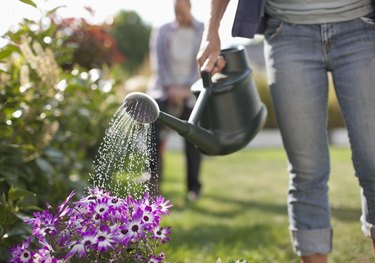
Humans enjoy a wide variety of beverages, from plain ol' water to coffee and tea, cocktails and artfully constructed smoothies filled with the latest fad ingredients. One reason for the popularity of a few of these beverages – sports drinks and those smoothies come to mind – is that they contain nutrients you don't get from plain water.
If you have a garden or houseplants, it's only natural to extend that thought process to your plants and consider watering them with something a bit more interesting, such as fruit juice. So, would a plant grow if it was given juice instead of water? Sadly, the answer is "probably not," but juice can play a limited role in some instances.
Video of the Day
Video of the Day
Fruit Juice and Plants
In its pure state, fruit juice is not good for most plants simply because it is so acidic. As a rule, most plants are happiest in a soil that ranges from a pH of 6.5 to 7, which is slightly acidic to neutral (7 is the neutral midpoint on the 0 to 14 pH scale).
In comparison, fruit juices are typically much more acidic. Orange juice checks in at a pH of 3.82 and apple juice at 3.64. Lemon juice is highly acidic at a pH of just 2.25. Most plants simply aren't prepared to deal with that level of acidity.
Aside from your plants not liking fruit juice, you'll also need to think about the various organisms that do like fruit juice. These include a variety of molds, yeasts and fungi, which can lead to some unusually interesting sights and smells in your pots and planters. Another pest that's attracted to fruit juice is the fruit fly, and they can be maddeningly difficult to eradicate once they've gotten established in your home.
Deliberately Acidifying Soil
So, if fruit juice and plants aren't a natural fit, why does the idea of watering plants with juice (or milk, soda, coffee or ... whatever) keep cropping up online? Partly, it's because gardeners love to experiment, but there are also a couple of scenarios in which there's a legitimate use for fruit juice in gardening.
One is to acidify the soil deliberately if you want to grow plants that require a more acidic soil in order to flourish. A number of plants favor acidic soils, with rubber plants, snake plants and some ferns (for example) flourishing happily in soils with a pH as low as 4.0 or 4.5. Outdoors, azaleas and blueberries are notable examples.
The most traditional way to acidify your soil is by adding sulfur, but lemon juice or another fruit juice would work just as well. Dilute it well to avoid attracting flies – a tablespoon at most per cup of water – and water with this mixture until your soil reaches its target pH when tested.
Fermented Fruit Juice
One kind of fruit juice that does demonstrably improve the fertility of your soil (and therefore your plants) is the fermented kind used in Korean natural farming. This technique attempts to boost soil by creating conditions that favor the growth of the soil's natural, healthy populations of bacteria, fungal mycelium and other microorganisms.
Your half glass of leftover orange juice isn't what they're talking about, though you can certainly add it if you wish. The main ingredients are typically some combination of fruits or vegetables or even just the healthy green tips of growing plants. These are mixed together with brown sugar, covered with gauze to let spores and microbes in but to keep bugs out and left to ferment. (Spoiler: This is something you probably don't want to do in a small apartment.)
Over a period of weeks, the plant matter will give up its juices, which will be filled with both conventional nutrients and a lively culture of microorganisms. Diluting this "juice" and then using it to water your plants will give you healthier soil and healthier plants.
- Revitalizing Smiles: pH Values of Common Beverages & What They Do to Your Teeth
- Sunny Life Mag: 40 Popular Houseplants That Like Acidic Soil
- Healthy Houseplants: Is Your Houseplant Suffering from Improper Soil pH? You Can Grow That!
- Bob Vila: 11 Things You Didn't Know That Houseplants Love
- University of Hawai'i at Manoa College of Tropical Agriculture and Human Resources: Natural Farming: The Development of Indigenous Microorganisms Using Korean Natural Farming Methods